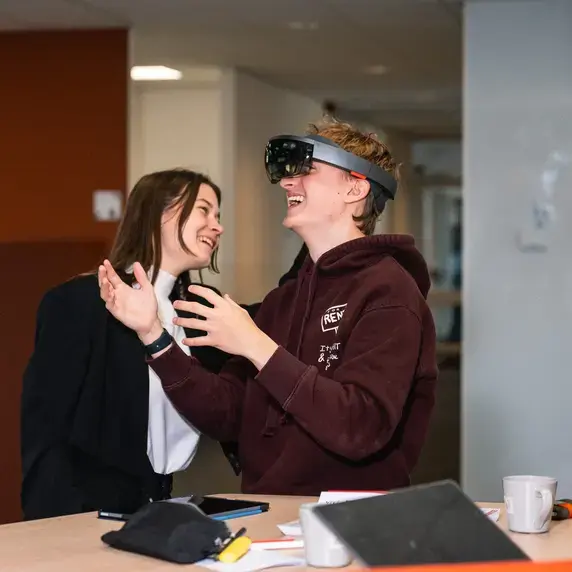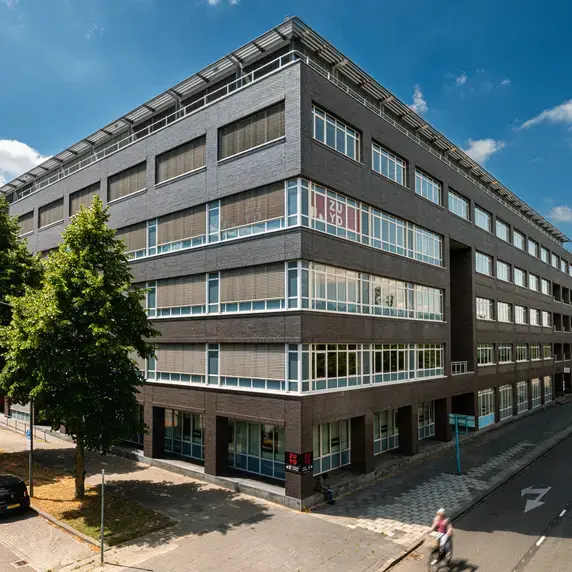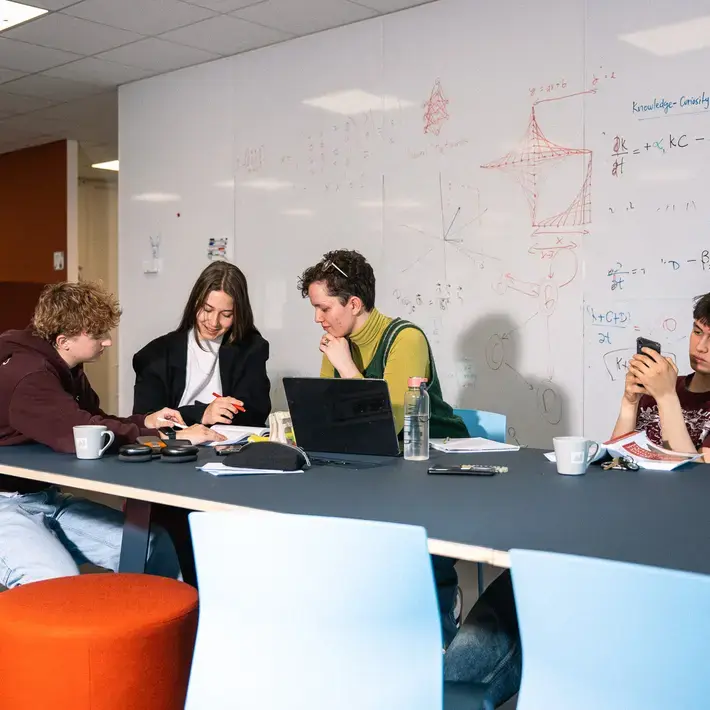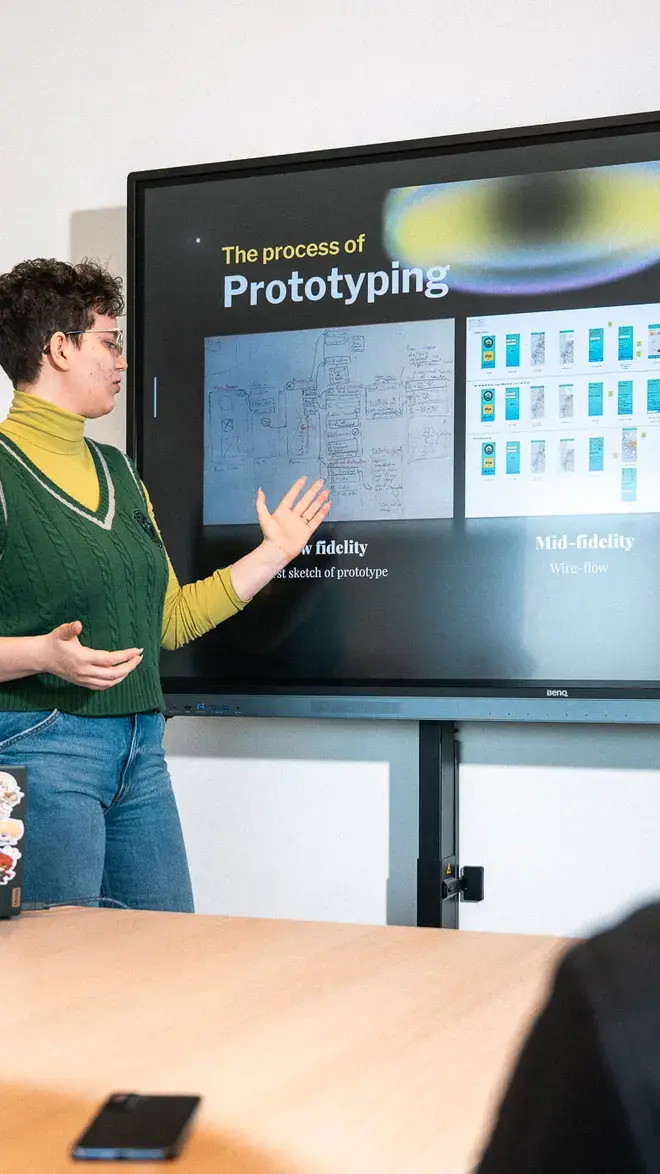
In short
Help doctors detect and predict diseases early. Or accelerate the energy transition by developing intelligent systems that predict our energy needs. We dive into data and algorithms, but also look at the impact of AI on society.
Good to know: the Artificial Intelligence bachelor is taught entirely in English, preparing you right from the start for an international working environment.
Does Applied Data Science & AI suit you? Solve complex problems with practical solutions – including logical reasoning. Technology is key, but curiosity and creativity are just as essential. In this programme, you’ll learn everything about designing intelligence.
You’ll also explore important questions, such as: How will AI impact society? What ethical considerations should we take into account? You’ll learn to understand and shape interactions between people and machines. The international programme Applied Data Science & Artificial Intelligence (ADSAI) is the ideal choice if you want to combine engineering with insight into the human aspects of technology.
Join our Open Day
Ask all your questions, soak up the atmosphere and experience what it’s like to study here. Whether you already know what you want or are still deciding, discover what truly suits you during the open day.
Try an Experience Day?
Experience a programme from the inside. During an experience day, you’ll follow a schedule together with other prospective students.
Download the programme brochure
Everything about the programme content, admission, internships and future opportunities, all in one clear document.
Why study Applied Data Science & Artificial Intelligence?
-
Solutions that matter
From day 1, tackle real-world problems and see your ideas make an impact.
-
Global perspective in Maastricht
Study in English and collaborate with students from around the world.
-
AI with a heart: technology and ethics
Learn to build intelligent systems while considering ethics and real-world consequences.
-
You choose your own path
Shape your learning through minors, internships, and graduation projects.
-
Personal guidance
A dedicated study coach helps you discover and grow your strenghts into a career in AI.
Study in the student city of Maastricht
You study Applied Data Science & AI hbo at a brand-new Zuyd campus in Maastricht. Equipped with the latest technologies, this modern building provides an inspiring learning environment where you can fully collaborate and explore.
The campus is centrally located and easily accessible by public transport. From Maastricht Randwyck train station, you can walk there in five minutes. You’ll also be surrounded by other students, thanks to the proximity to Maastricht University and the university hospital. This means that during your bachelor in computer science and artificial intelligence, you’ll be part of a dynamic, international environment where you’ll quickly feel at home.

We are Zuyd. We are close-knit, sincere and confident

Programme Structure
At Applied Data Science and Artificial Intelligence we start with a broad introduction, then dive deeper with specialisations and practical assignments. You’ll see how theory and practice come together. We’ll also tell you about internships and personal guidance.
Your first year
In your first year at the bachelor in Applied Data Science and Artificial Intelligence Maastricht you’ll build a solid foundation. You’ll be introduced to programming, algorithms, and data structures, alongside mathematics, which plays a central role. Math forms your toolbox – helping you understand data more deeply and build smart, practical applications. You’ll rely on these skills throughout your AI bachelor studies and well into your career.
But this programme is not just technical. You’ll also explore how people, data, and machines interact and influence one another. You’ll examine how AI can improve daily life, and where we need to proceed carefully to ensure ethical and responsible use. Because ADSAI is an international programme, you’ll develop intercultural skills and collaborate with students from diverse backgrounds. You’ll get to know each other well, gain insight into different perspectives, and discover how valuable a diverse worldview is.
From the first year of the BSc artificial intelligence HBO programme, you’ll work on real-life cases. This is how you discover the impact your ideas can have in practice. At the same time, you’ll explore your new study environment. Maastricht and the surrounding region play an important role in the Applied Data Science & AI bachelor. You’ll visit companies and organisations in the area, gaining insight into the local professional field. You’ll experience what it’s like to collaborate on projects in a close-knit learning community.
Each study week kicks off with lectures outlining what you’ll work on. You’ll then dive into hands-on assignments in smaller groups. Throughout, you’ll receive personal guidance and have plenty of space for your own questions, ideas, and initiatives. Step by step, you’ll build the skills you need to become a successful and responsible AI professional.
Advanced study and practical experience
In the second year of the programme Applied Data Science & Artificial Intelligence bachelor's degree, you will build on what you learnt in the first year. You’ll dive deeper into advanced techniques and broaden your knowledge of the field. Central to this is solving more complex, realistic problems, with an international outlook.
You will delve further into algorithms and learn how to use advanced techniques, such as deep learning, to tackle complex data challenges. Think of recognising patterns in imagery, predicting trends or developing smart systems that can learn on their own. Besides the technical side, you will also be introduced to responsible research and ethical issues. You will learn to look critically at what responsible research means in practice and how to use data and AI in a fair and transparent way.
Even in your second year, studying data science and AI remains something you mainly do together. You will actively engage in projects that focus on teamwork, communication, and professional presentation. You’ll tackle real assignments with fellow students from different countries and backgrounds – learning how to communicate effectively, collaborate, and reach solutions together.
You’ll also develop your research skills during your bachelor of science artificial intelligence. You’ll learn how to find, analyse, and apply reliable information in your projects. You’ll become more critical, learning how to conduct research responsibly and interpret results accurately.
You’ll continue to benefit from the rich ecosystem around the AI programme. Through collaborations with regional businesses, such as the Research Centre Data Intelligence and the Brightlands Campuses, you’ll encounter real-world challenges early on in your AI studies. This practical experience shows you just how valuable your skills and knowledge can be for companies and organisations.
The second part of year 3 and the first part of year 4 are dedicated to minors (electives). This is where you steer your studies in a direction that matches your interests and career goals. In total, you’ll complete four minors. At least two minors will be within ADSAI, the other two minors can be from other programmes if you wish. Broaden your knowledge with a minor in a different field, for example, entrepreneurship or communication. You can even choose to go abroad. This way, you design an artificial intelligence bachelor study path that suits your interests and career plans.
Combining theory, practice, teamwork, and ethical awareness, you’ll grow into a versatile AI professional, ready for the international job market. During your bachelor’s thesis, you’ll bring together all your knowledge and skills to develop a real solution using data science and AI. After successfully completing your thesis, you’ll have your BSc artificial intelligence degree in hand and be ready to launch your career.
Internships
In the third year of the artificial intelligence bachelor's degree you’ll complete your first internship. This internship lasts six months (two blocks) and takes place at an organisation in the EU region.
You can look for an interesting internship position yourself, but the programme also has many partnerships with companies and institutions, including APG, CBS, Zuyderland, DHL and Medlands. And Brightlands partners who are eager to work with students who have AI expertise.
During your internship, you’ll see first-hand how your knowledge of data science and AI can make a difference in practice. You’ll work alongside professionals, learn how AI is applied within companies, and gain valuable insight into which roles and tasks suit you best.
Guidance and support
Throughout your bachelor of computer science artificial intelligence studies you’ll never be on your own. From day one, you’ll benefit from excellent support from a committed team of highly qualified teachers with extensive real-world experience. Our lecturers know what’s happening in the fast-moving world of data science and AI. They’re always ready to help you with questions, offer practical advice, and challenge you to reach your full potential.
In addition to subject-specific support, you’ll also receive personal guidance throughout your entire study journey. Your student counsellor will work with you to reflect on your development and help you make choices that align with your interests and talents. This personal approach means you’ll feel at home quickly within the bachelor in ai and machine learning programme and have every opportunity to grow into a confident AI professional.
You’ll also be part of an active international learning community. This network of students, lecturers, researchers, and industry professionals will give you the chance to participate in workshops and events that support your professional growth. Thanks to this international exchange of knowledge and experience, you’ll learn a lot from real-world practice while gaining a broader perspective on the field of AI worldwide.
Your first year
Your first year
In your first year at the bachelor in Applied Data Science and Artificial Intelligence Maastricht you’ll build a solid foundation. You’ll be introduced to programming, algorithms, and data structures, alongside mathematics, which plays a central role. Math forms your toolbox – helping you understand data more deeply and build smart, practical applications. You’ll rely on these skills throughout your AI bachelor studies and well into your career.
But this programme is not just technical. You’ll also explore how people, data, and machines interact and influence one another. You’ll examine how AI can improve daily life, and where we need to proceed carefully to ensure ethical and responsible use. Because ADSAI is an international programme, you’ll develop intercultural skills and collaborate with students from diverse backgrounds. You’ll get to know each other well, gain insight into different perspectives, and discover how valuable a diverse worldview is.
From the first year of the BSc artificial intelligence HBO programme, you’ll work on real-life cases. This is how you discover the impact your ideas can have in practice. At the same time, you’ll explore your new study environment. Maastricht and the surrounding region play an important role in the Applied Data Science & AI bachelor. You’ll visit companies and organisations in the area, gaining insight into the local professional field. You’ll experience what it’s like to collaborate on projects in a close-knit learning community.
Each study week kicks off with lectures outlining what you’ll work on. You’ll then dive into hands-on assignments in smaller groups. Throughout, you’ll receive personal guidance and have plenty of space for your own questions, ideas, and initiatives. Step by step, you’ll build the skills you need to become a successful and responsible AI professional.
Advanced study and practical experience
Advanced study and practical experience
In the second year of the programme Applied Data Science & Artificial Intelligence bachelor's degree, you will build on what you learnt in the first year. You’ll dive deeper into advanced techniques and broaden your knowledge of the field. Central to this is solving more complex, realistic problems, with an international outlook.
You will delve further into algorithms and learn how to use advanced techniques, such as deep learning, to tackle complex data challenges. Think of recognising patterns in imagery, predicting trends or developing smart systems that can learn on their own. Besides the technical side, you will also be introduced to responsible research and ethical issues. You will learn to look critically at what responsible research means in practice and how to use data and AI in a fair and transparent way.
Even in your second year, studying data science and AI remains something you mainly do together. You will actively engage in projects that focus on teamwork, communication, and professional presentation. You’ll tackle real assignments with fellow students from different countries and backgrounds – learning how to communicate effectively, collaborate, and reach solutions together.
You’ll also develop your research skills during your bachelor of science artificial intelligence. You’ll learn how to find, analyse, and apply reliable information in your projects. You’ll become more critical, learning how to conduct research responsibly and interpret results accurately.
You’ll continue to benefit from the rich ecosystem around the AI programme. Through collaborations with regional businesses, such as the Research Centre Data Intelligence and the Brightlands Campuses, you’ll encounter real-world challenges early on in your AI studies. This practical experience shows you just how valuable your skills and knowledge can be for companies and organisations.
The second part of year 3 and the first part of year 4 are dedicated to minors (electives). This is where you steer your studies in a direction that matches your interests and career goals. In total, you’ll complete four minors. At least two minors will be within ADSAI, the other two minors can be from other programmes if you wish. Broaden your knowledge with a minor in a different field, for example, entrepreneurship or communication. You can even choose to go abroad. This way, you design an artificial intelligence bachelor study path that suits your interests and career plans.
Combining theory, practice, teamwork, and ethical awareness, you’ll grow into a versatile AI professional, ready for the international job market. During your bachelor’s thesis, you’ll bring together all your knowledge and skills to develop a real solution using data science and AI. After successfully completing your thesis, you’ll have your BSc artificial intelligence degree in hand and be ready to launch your career.
Internships
Internships
In the third year of the artificial intelligence bachelor's degree you’ll complete your first internship. This internship lasts six months (two blocks) and takes place at an organisation in the EU region.
You can look for an interesting internship position yourself, but the programme also has many partnerships with companies and institutions, including APG, CBS, Zuyderland, DHL and Medlands. And Brightlands partners who are eager to work with students who have AI expertise.
During your internship, you’ll see first-hand how your knowledge of data science and AI can make a difference in practice. You’ll work alongside professionals, learn how AI is applied within companies, and gain valuable insight into which roles and tasks suit you best.
Guidance and support
Guidance and support
Throughout your bachelor of computer science artificial intelligence studies you’ll never be on your own. From day one, you’ll benefit from excellent support from a committed team of highly qualified teachers with extensive real-world experience. Our lecturers know what’s happening in the fast-moving world of data science and AI. They’re always ready to help you with questions, offer practical advice, and challenge you to reach your full potential.
In addition to subject-specific support, you’ll also receive personal guidance throughout your entire study journey. Your student counsellor will work with you to reflect on your development and help you make choices that align with your interests and talents. This personal approach means you’ll feel at home quickly within the bachelor in ai and machine learning programme and have every opportunity to grow into a confident AI professional.
You’ll also be part of an active international learning community. This network of students, lecturers, researchers, and industry professionals will give you the chance to participate in workshops and events that support your professional growth. Thanks to this international exchange of knowledge and experience, you’ll learn a lot from real-world practice while gaining a broader perspective on the field of AI worldwide.
Let's Meet
Not sure about your study choice yet? During an open day or trial study moment you’ll discover what Applied Data Science and Artificial Intelligence is really like. We take the time for you, answer your questions and show you around the campus.
Explore from home?
Want to know more about the Applied Data Science & Artificial Intelligence programme, but can't come to Maastricht in person? Then join one of our online sessions. This digital introduction is especially suitable for international students or if you are still unsure whether the bachelor of science in data science and artificial intelligence really suits you.
What can you expect?
During an online session, lecturers and students will take you into the world of data science and AI. We will tell you all about the content of our data science and AI course, the subjects you will get and how we approach them. We will also discuss what interests and skills are a good fit for the AI bachelor, so you can assess whether this course is for you. You will also discover which professions you can pursue after your studies and what the job market opportunities look like.
In addition, each online session is dedicated to a specific theme. One session, for example, you might discover how coding works; another time you’ll play an AI game, learn about smart algorithms, or explore important topics such as ethics and the responsible use of AI. Step by step, you’ll gain a better understanding of the versatility of data science and AI.
You’ll also have plenty of opportunities to ask questions during a live Q&A. Our students are happy to share their personal experiences and answer your questions honestly – about studying in Maastricht, student life, and their future plans. Tutors will also offer practical tips on how to best prepare for your bachelors in intelligence.
After this online session, you’ll have a clearer idea of what ADSAI has to offer and what your future could look like. Sign up and find out, in an accessible way, whether this programme is the right choice for you.

Experience it with a trial study day
Would you like to experience what it is really like to study Applied Data Science & Artificial Intelligence bachelor (ADSAI)? A trial study day is what you may need. Drop by our brand-new campus in Maastricht or visit the Brightlands Smart Services Campus in Heerlen. This will give you a good idea of what to expect if you choose ADSAI.
Experience Day in Maastricht
During this experience day in our brand-new building in Maastricht, you will discover exactly what our programme on AI and data science is all about: what will you learn and how will you learn it? You attend a mini lecture, discuss with fellow students, and get hands-on with a real assignment. Lecturers and students are ready to answer all your questions. Of course, you will also get a taste of the atmosphere and meet your future fellow students in advance. The programme lasts from 09:00 to about 14:30.
Trail study day in Heerlen
Are you curious about what you can do later with your ADSAI degree? Then come for a trial study day at the Brightlands Smart Services Campus in Heerlen. We take you to companies that are working on AI and data science every day. You talk to professionals; see how they work and experience the challenges they work on. Of course, you will also actively engage in a practical workshop yourself. This will give you a good idea of your future after your BSc in artificial intelligence and machine learning. This day also lasts from 9:00 to around 14:30.
Student for a day
Just want to experience what a normal study day looks like? Then sign up for Student for a Day. You join real lectures, discuss class material in small groups and work together on practical assignments. Of course, that includes lunch together, the chance to get to know fellow students and ask all about their experiences at ADSAI. The programme starts at 08:30 and ends at about 14:30.
At all trial study days, there will be plenty of room for all your questions. You will meet students and teachers who will be happy to tell you about their experiences, the programme and student life at our AI bachelor. This will give you a clear picture of your future study time.

Open Day at Applied Data Science & AI
During our Open Day, you will discover what the Applied Data Science & Artificial Intelligence bachelor's degree exactly entails. Lecturers and students give interactive presentations and demonstrations. You will experience first-hand what it is like to study at ADSAI, and how we apply data science and AI in practice.
In addition, during the Open Day you’ll have ample opportunity to explore our modern location in Maastricht. This way, you can get a taste of the building's atmosphere and see for yourself where you will be studying. A great opportunity to get acquainted with your future fellow students and teachers!

What Comes Next
After Applied Data Science and Artificial Intelligence you can go in many directions. From working in the field to continuing your studies – the choice is yours. We’ll show you the possibilities, with honest information about opportunities and earnings.
The personal atmosphere made the difference.
Chanaika studied at Zuyd and looks back on her student days with joy. “At Zuyd, I never felt like just a number,” she shares. “The close-knit atmosphere and the personal connection with fellow students and lecturers made me feel at home right away.”
During her studies, she worked on projects for real organizations. “It was inspiring to put into practice what I had learned in class straight away.” She also had the freedom to broaden and deepen her knowledge through minors and internships. “Those opportunities really expanded my perspective on the professional field.”
The sense of community at Zuyd has always stayed with her, through activities and encounters that created real connection. “The combination of learning, doing, and experiencing together gave me the confidence to apply my knowledge in the workplace.

Your future after
Professions
Job prospects and salary
With an Applied Data Science & Artificial Intelligence bachelor, you’ll have excellent job opportunities. The demand for data science and AI professionals continues to rise. In the Netherlands alone, there are thousands of vacancies for AI and data science specialists – and the salary prospects are attractive too.
With this AI bachelor, you can work in a wide range of sectors. Think of companies such as APG, CBS, and DHL, but also in healthcare, government, or education. For example, you might help hospitals predict disease patterns, develop AI solutions for logistics, or optimise marketing strategies using data analytics.
Continue studying
Want to continue studying after your bachelor in AI and machine learning? You can! Our programme has partnerships with the Open University and Maastricht University, making it easier for you to move on to a university master’s degree.
Some options include:
- Artificial Intelligence (UM): dive deeper into advanced AI techniques and applications.
- Data Science for Decision Making (UM): learn to apply mathematical and statistical models to tackle complex challenges.
- Computer Science (Open University): focus on software development, algorithms, and programming techniques.
A master’s will help you specialise further and can boost your opportunities for managerial or research roles. So with ADSAI, you’ll keep all your options open – whether you choose to start your career or continue your studies.
Practical Information
Thinking about studying Applied Data Science & Artificial Intelligence? Of course you want to know what to expect. How to apply, what the admission requirements are and how the costs work. We explain it all clearly.
Study load and study advice
Your week begins with lectures, where you’ll explore new topics together with your fellow international students. Here, you’ll gain the theoretical foundation you need to tackle assignments and projects for your bachelor of science in intelligence.
In discussion lectures, you’ll dive deeper into the material in smaller groups. You’ll debate issues, exchange ideas, and learn to think critically about AI applications. A lecturer guides these sessions, helping you expand your insights.
In addition to lectures, you’ll work independently and in teams on innovative projects. At the start of your Data Science and AI bachelor, these projects help you apply the basics you’ve learned. Soon, you’ll tackle real practical assignments in collaboration with companies and organisations in the region. For example, you may work with businesses at the Brightlands campuses, developing AI solutions for current challenges in healthcare, logistics, or sustainable energy.
On average, you’ll spend about 40 hours per week on your artificial intelligence bachelor degree. Alongside your contact hours with teachers, you’ll work independently and in project groups. You’ll practise data analysis, program AI models, and develop applications that prepare you for your future career after your Data Science and AI degree.
Learning routes
There are no separate learning pathways within our Applied Data Science & Artificial Intelligence programme for students who have already completed a vocational or pre-university education programme.
Application
Want to start Applied Data Science & Artificial Intelligence? Great! Some programmes have additional admission requirements, so check these in advance. After you apply, we’ll invite you for a study choice check to make sure the programme is the right fit for you, so you can start well prepared.
Tuition fees
As a degree-seeking student you will have to pay annual tuition fees. Students from the EU pay the statutory tuition fees, and non-EU students pay the institutional tuition fees. Normally speaking, these fees are waived for exchange students from partner universities.
Education and examination regulations
The education and examination regulations (EER) provide all the information you will need about the content of the study programme, the academic support provided, and the way in which examinations are organised.
Study in the Netherlands
Curious about what it’s like to study in the Netherlands? From outstanding education to a warm, international atmosphere, it’s all here. Discover what makes the Netherlands such a great study destination. We tell you all about it on the Study in the Netherlands page.
Study load and study advice
Study load and study advice
Your week begins with lectures, where you’ll explore new topics together with your fellow international students. Here, you’ll gain the theoretical foundation you need to tackle assignments and projects for your bachelor of science in intelligence.
In discussion lectures, you’ll dive deeper into the material in smaller groups. You’ll debate issues, exchange ideas, and learn to think critically about AI applications. A lecturer guides these sessions, helping you expand your insights.
In addition to lectures, you’ll work independently and in teams on innovative projects. At the start of your Data Science and AI bachelor, these projects help you apply the basics you’ve learned. Soon, you’ll tackle real practical assignments in collaboration with companies and organisations in the region. For example, you may work with businesses at the Brightlands campuses, developing AI solutions for current challenges in healthcare, logistics, or sustainable energy.
On average, you’ll spend about 40 hours per week on your artificial intelligence bachelor degree. Alongside your contact hours with teachers, you’ll work independently and in project groups. You’ll practise data analysis, program AI models, and develop applications that prepare you for your future career after your Data Science and AI degree.
Learning routes
Learning routes
There are no separate learning pathways within our Applied Data Science & Artificial Intelligence programme for students who have already completed a vocational or pre-university education programme.
Application
Application
Want to start Applied Data Science & Artificial Intelligence? Great! Some programmes have additional admission requirements, so check these in advance. After you apply, we’ll invite you for a study choice check to make sure the programme is the right fit for you, so you can start well prepared.
Tuition fees
Tuition fees
As a degree-seeking student you will have to pay annual tuition fees. Students from the EU pay the statutory tuition fees, and non-EU students pay the institutional tuition fees. Normally speaking, these fees are waived for exchange students from partner universities.
Education and examination regulations
Education and examination regulations
The education and examination regulations (EER) provide all the information you will need about the content of the study programme, the academic support provided, and the way in which examinations are organised.
Study in the Netherlands
Study in the Netherlands
Curious about what it’s like to study in the Netherlands? From outstanding education to a warm, international atmosphere, it’s all here. Discover what makes the Netherlands such a great study destination. We tell you all about it on the Study in the Netherlands page.
Admission requirements
Non-Dutch
A secondary school diploma equivalent to the Dutch levels (MBO-4, HAVO and VWO) , e.g.:
- Abitur, Fachhochschulreife
- International baccalaureate, European Baccalaureate
- High school, GPA average at least 3.0
Extra admission requirements
English language
EU
Additional proof of English for EU students is only needed when they did not have English as their exam course.
Non-EU
Students from outside of the EU are required to take an IELTS (score at least 6) or TOEFL test (paper score at least 550 or Internet 80). Please note that your test results must be valid at the start of the programme. TOEFL and IELTS scores expire after 2 years. Cambridge certificates are valid indefinitely.
Mathematics
Given the prerequisite for mathematics knowledge and skills in the ADSAI programme, you must demonstrate proof through the submission of a relevant certificate or examination result from one of the following:
- Dutch havo or vwo: diploma including Mathematics A or B
- International: EQF level 4 diploma with mathematics up to and including the final year
If you do not meet these mathematics requirements you have to pass the OMPT test level C.
Immigration regulations
Do not forget to check the immigration regulations imposed by the Dutch authorities. Depending on your nationality, you may need to apply for a visa for The Netherlands. This can be a time-consuming and expensive process. Therefore, start your application process well in advance to avoid disappointment.
Application deadline
Applications for enrolment should be in our possession before the deadline. They differ for EU- and Non-EU students:
- NL students: 1st of July
- EU students: 1st June
- Non-EU students: 1st May
Havo
- Profile Science & Technology
- Profile Science & Health
- Profile Economics & Society
Specific requirements apply to the profile below:
- Profile Culture & Society: plus Mathematics A or Mathematics B or OMPT-C
Vwo
- Profile Science & Technology
- Profile Science & Health
- Profile Economics & Society
Specific requirements apply to the profile below:
- Profile Culture & Society: plus Mathematics A or Mathematics B or OMPT-C
Mbo
With a level 4 vocational education (mbo-4) diploma, you are admitted to the programme.
21+
Exemption of the pre-university requirements is only possible on the basis of a binding admission examination. You are only eligible for this examination if you are 21 years of age or older. Read more about the 21+ test.
In addition you need to pass the OMPT test level C for mathematics. You are also required to take an IELTS (score at least 6) or TOEFL test (paper based 550 or internet based 80 ). Please note that your test results must be valid at the start of the programme. TOEFL and IELTS scores expire after 2 years. Cambridge certificates are valid indefinitely.
Join our Open Day
Ask all your questions, soak up the atmosphere and experience what it’s like to study here. Whether you already know what you want or are still deciding, discover what truly suits you during the open day.

Try an Experience Day?
Experience a programme from the inside. During an experience day, you’ll follow a schedule together with other prospective students.

Download the programme brochure
Everything about the programme content, admission, internships and future opportunities, all in one clear document.







